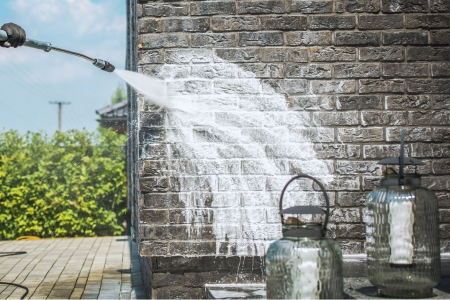Choosing the Right Cleaning Method: Soft Wash vs. Pressure Wash

When it comes to cleaning outdoor surfaces, especially those covered in dirt, grime, algae, or mold, two popular methods stand out: soft washing and pressure washing. Each technique has its own set of advantages and ideal applications. In this article, we'll delve into the differences between soft washing and pressure washing to help you choose the right cleaning method for your needs.
Soft Wash: Gentle Cleaning with Biodegradable Solutions
Soft washing is a method of cleaning that utilizes low-pressure water combined with specialized cleaning solutions to gently remove dirt, stains, and organic growth from surfaces. Here's what you need to know about soft washing:
- Low Pressure: Soft washing typically involves using water pressure lower than 1000 PSI (pounds per square inch). This gentle pressure is safe for delicate surfaces such as roofs, siding, and wooden decks.
- Biodegradable Solutions: Soft washing relies on eco-friendly cleaning solutions that break down dirt and organic matter without causing harm to plants, animals, or the environment.
- Effective for Organic Growth: Soft washing is particularly effective for removing algae, mold, mildew, and other organic growth commonly found on exterior surfaces.
Pressure Wash: Powerful Cleaning with High-Pressure Water
Pressure washing, also known as power washing, involves using high-pressure water to clean surfaces. It's a more forceful method compared to soft washing and is suitable for a variety of applications. Here are the key aspects of pressure washing:
- High Pressure: Pressure washers typically deliver water at pressures ranging from 1500 to 4000 PSI. This high-pressure stream is effective for blasting away tough stains, grease, grime, and other stubborn debris.
- Versatile Cleaning: Pressure washing is suitable for a wide range of surfaces, including concrete driveways, sidewalks, brick walls, and metal fences. It's also commonly used for prepping surfaces before painting or staining.
- Quick Results: Due to its high-pressure output, pressure washing can quickly and efficiently clean large areas, making it an ideal choice for tackling heavy-duty cleaning tasks.
Choosing the Right Method: Factors to Consider
Now that we've explored the characteristics of soft washing and pressure washing, how do you decide which method is right for your cleaning needs? Consider the following factors:
- Surface Material: Soft washing is best suited for delicate tasks such as roof cleaning, siding washing, and fence cleaning, while pressure washing is more appropriate for durable materials like concrete, brick, and metal.
- Type of Stains: Soft washing is effective for removing organic stains like algae and mold, whereas pressure washing is better for tackling oil stains, grease, and built-up grime.
- Environmental Concerns: If you're concerned about environmental impact, opt for soft washing, which uses biodegradable cleaning solutions and minimal water consumption compared to pressure washing.
- Time and Efficiency: Pressure washing tends to be faster and more efficient for large surface areas, making it a better choice for time-sensitive projects or heavy-duty cleaning tasks.
In the debate between soft washing and pressure washing, there's no one-size-fits-all answer. The right cleaning method depends on factors such as surface material, type of stains, environmental considerations, and desired results. Whether you choose the gentle approach of soft washing or the powerful cleaning capabilities of pressure washing, both methods can help restore the beauty and cleanliness of your outdoor spaces.
Ready to revitalize your outdoor surfaces? Contact The Clean Machine today at 616-843-6835 to schedule your professional cleaning service. Say goodbye to dirt and grime and hello to a sparkling clean property!